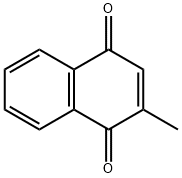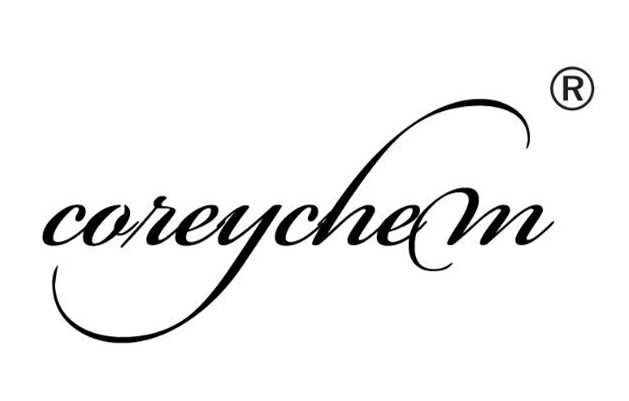

Menadione
| Price | USD1.00 |
| Packge | 1KG |
- Min. Order:1G
- Supply Ability:100KG
- Time:2019-07-06
Product Details
- Product NameMenadione
- CAS No.58-27-5
- EINECS No.200-372-6
- MFC11H8O2
- MW172.18
- InChIKeyMJVAVZPDRWSRRC-UHFFFAOYSA-N
- Appearancecrystallineyellow
- Melting point 105-107 °C(lit.)
- storage temp. room temp
- Water Solubility INSOLUBLE
- Boiling point 262.49°C (rough estimate)
- density 1.1153 (rough estimate)
AD68
| Menadione Basic information |
| Product Name: | Menadione |
| Synonyms: | usafek-5185;VitaminK0;β-Methyl-1,4-naphthoquinone;Menadione (1.05793);MENADIONE, USP;MENADIONE (K3) 1000MG NEAT;(MENADIONE)VITAMIN K3, 98+% USP;VITAMIN K3(FEEDSTUFF GRADEMSB96) |
| CAS: | 58-27-5 |
| MF: | C11H8O2 |
| MW: | 172.18 |
| EINECS: | 200-372-6 |
| Product Categories: | Biochemistry;Vitamins;Nutritional fortification substances;Vitamins and derivatives;Vitamin Ingredients;Miscellaneous Compounds;Aromatics;Intermediates & Fine Chemicals;Pharmaceuticals;RUMENSIN;Isolabel;Other APIs;Inhibitors;feeding additive raw materials |
| Mol File: | 58-27-5.mol |
 |
|
| Menadione Chemical Properties |
| Melting point | 105-107 °C(lit.) |
| Boiling point | 262.49°C (rough estimate) |
| density | 1.1153 (rough estimate) |
| refractive index | 1.5500 (estimate) |
| storage temp. | Store at RT. |
| solubility | oil: soluble |
| form | crystalline |
| color | yellow |
| Water Solubility | INSOLUBLE |
| Sensitive | Light Sensitive |
| Merck | 14,5831 |
| BRN | 1908453 |
| Stability: | Stable. May be light sensitive. Incompatible with strong oxidizing agents. |
| InChIKey | MJVAVZPDRWSRRC-UHFFFAOYSA-N |
| CAS DataBase Reference | 58-27-5(CAS DataBase Reference) |
| NIST Chemistry Reference | Menadione(58-27-5) |
| EPA Substance Registry System | 1,4-Naphthalenedione, 2-methyl-(58-27-5) |
| Safety Information |
| Hazard Codes | Xn,Xi |
| Risk Statements | 22-36/37/38-43 |
| Safety Statements | 26-36-37/39-24 |
| WGK Germany | 3 |
| RTECS | QL9100000 |
| F | 8 |
| TSCA | Yes |
| HazardClass | IRRITANT |
| Hazardous Substances Data | 58-27-5(Hazardous Substances Data) |
| Toxicity | LD50 orally in mice: ~0.5 g/kg (Molitor, Robinson) |
| Menadione Usage And Synthesis |
| Chemical properties | It appears as white crystalline or crystalline powder, being almost odorless and hygroscopic. Its color will change in case of light. It is easily soluble in water, slightly soluble in ethanol, but insoluble in ether and benzene. |
| Application | Biochemical research; clinical drugs belong to fat-soluble vitamins; it is clinically used as a hemostatic drug. Vitamin K3 is mainly used as poultry feed enhancer at a dosage of 1-5mg/kg. The goods can have addition reaction with sodium bisulfite to generate vitamin K3. VK3. Used as raw material of feed additives; it can mainly promote the liver synthesis of prothrombin in livestock and poultry, and promote the liver synthesis of plasma coagulation factors as a hemostatic agent. Traits: bright yellow crystal with very spicy smell. It is stable in the air and will be decomposed in sunlight. 1G can be dissolved in about 60ml ethanol, 10ml benzene and 50 ml vegetable oil. It is soluble in chloroform and carbon tetrachloride but insoluble in water. The ethanol solution was neutral to litmus paper. The solution will not be decomposed even when heated to 120 °C. It will be destroyed upon treatment with alkali and reducing agent. It is toxic with the half lethal dose (mouse, oral) being about 500 mG/kG. It is irritating. Its commodities still include sodium bisulfite manaquinone, appearing as white crystalline powder. It has no smell or with slightly special smell. It has hygroscopicity. It undergoes decomposition in case of light to turn into yellow or purple color. It is easily soluble in water, slightly soluble in ethanol, but almost insoluble in ether and benzene. Application: biochemical research |
| Production | There are two production processes. 1. Methyl naphthalene is obtained from the oxidization of chromic anhydride. 2-methyl naphthalene is dissolved in glacial acetic acid, stirred and cooled to temperature below 40 ℃. Slowly add the mixture of chromic anhydride and the same amount of water so that the temperature can be maintained at 35-40 ℃. After the completion of the addition, maintain the temperature at 40 ℃ for 0.5 h, the temperature was then raised to 70 ℃ for 45min, and further heated to 85 ℃ for 15min. Pour the reactants into a lot of water and stir continuously to precipitate out the 2-naphthoquinone. Filter and rinse the filter cake repeatedly with water, until the aqueous solution has no sour. Filter to get the 2-menenoquinone with a yield of 51%. 2-methyl naphthalene can also be made from sodium dichromate and potassium dichromate with the oxidation yield being roughly the same. 2. Cyclohexanone has cyclization reaction with butadiene to get 2-methyl naphthalene hydroquinone, followed by oxidation with chromic acid to obtain the final product. Dissolve the toluquinone in glacial acetic acid; send the butadiene to the required amount at temperature below 20 ℃; stand for 20 hours; heat to release the remaining butadiene and continue to heat to about 110 °C for refluxing of 3 hours. Then recycle 30% of glacial acetic acid through vacuum distillation and cooled to temperature below 40 ℃; slowly add the mixture of chromic acid and the same amount of water so that the temperature is maintained at 65-70 ℃. After the completion of the addition, maintain the temperature at 70-80 degree for 1h to obtain the menadione. O-methyl naphthoquinone is used as raw material. It undergoes oxidation with glacial acetic acid and chromic anhydride, followed by addition with sodium bisulfite in ethanol to derive it. |
| Chemical Properties | Bright yellow crystals |
| Uses | Precursor to verious types of Vitamin K. Used as a micronutrient for livestock and pet foods. |
| Uses | prothrombogenic agent |
| Uses | antibacterial |
| Uses | The primary known function of vitamin K is to assist in the normal clotting of blood, but it may also play a role in normal bone calcification. |
| Definition | ChEBI: A member of the class of 1,4-naphthoquinones that is 1,4-naphthoquinone which is substituted at position 2 by a methyl group. |
Company Profile Introduction
Henan CoreyChem Co., Ltd, based on the original Zhengzhou Cote Chemical Research Institute, be brave in absorbing highly educated talents & overseas returnees; actively responded to Zhengzhou City High-tech Zone Government’s Special Care Policy, reorganized and founded in National University of Science and Technology Park, which is a high-tech, stock enterprise of high-end chemical Custom synthesis;The park was created by the People's Government of Henan Province, and proved by Ministry of Education and the National Science & Technology, taking the construction mode of "many college a park, and common development", mainly depends on Zhengzhou University and Henan University’s scientific research and talent advantage to set up Universities, scientific research institute and enterprise scientific research achievements transformation platform, to make high-tech enterprises incubate, is the new high-tech talent gathering base, high and new technology industry enterprise radiation base, colleges and universities technological innovation base.
Henan Coreychem Co., Ltd, facing global High-tech pharmaceutical raw materials, high complex new type intermediates, fine chemicals custom synthesis, scale-up production and Rare chemicals trade. Corey have well-equipped machine, strong technical force and considerate marketing team service. We also have rich experience advantage in basic research, small scale process development, scale-up, industrial technology development & production and cost control.
Recommended supplier
-
VIP1年
- Sanovi Pharmaceuticals Pvt Ltd
- Menadione 98%
- Inquiry
- 2024-03-04
-
VIP1年
- Suvan LifeSciences (formerly Sansh Biotech Pvt Ltd)
- 58-27-5 98%
- Inquiry
- 2024-02-29
-
VIP1年
- DeFINE CHEMICALS
- 58-27-5 Menadione 98%
- Inquiry
- 2024-02-01
-
VIP1年
- Besil Chem LLP
- Menadione 58-27-5 98%
- Inquiry
- 2024-01-29
-
VIP1年
- Honest BioVet
- Menadione 99%
- Inquiry
- 2023-12-30
-
VIP1年
- Dhanraj Rathod
- 58-27-5 99%
- Inquiry
- 2023-12-16
- Since:2014-12-17
- Address: No.967,15th Floor,Unit 7, Building 1, No.70 of DianChang Road, High-tech Development Zone, Zhengzho
INQUIRY
